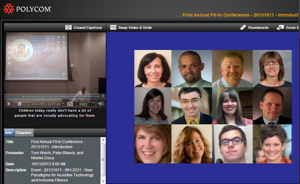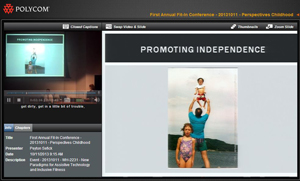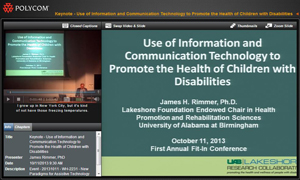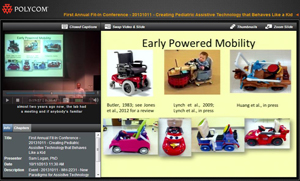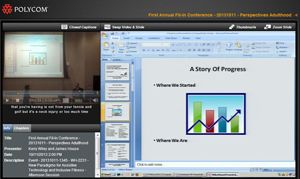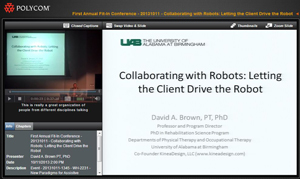New Paradigms for Assistive Technology and Inclusive Fitness
Each year we bring national leaders in the field of adapted sports and inclusive recreation to Syracuse in order to foster innovation and inclusion in our community. We try to change up the format and venue each year. The Fit-In conference is archived on our website in order to reach a wide audience.
Friday October 11, 2013
SUNY Upstate Medical University
New Paradigms for Assistive Technology and Inclusive Fitness
Objectives:
- Bring together key stake-holders to develop an action plan for inclusive fitness in CNY
- Provide state-of-the-art expertise on assistive technology for inclusive fitness
- Involve high school students in a workshop to adapt toy cars for kids with disabilities
- Recognize CNY United Power Soccer Team
- Launch a web resource/social media for promoting inclusive fitness
Videos
Introduction: Tom Welch, Peter Blanck, and Nienke Dosa
Perspectives: Childhood
Peyton Sefick, BA recently earned an undergraduate degree in psychology from Le Moyne College . He has been highly involved in power soccer for the past decade. He was selected to play on Team USA, which won the 2012 FIPFA World Cup. He is the team captain for CNY United, which won the 2012 Champions Cup. Peyton has been highly active in the spread of power soccer, traveling as far as Paris, France to connect with athletes and to strengthen programs.
Keynote – Use of Information and Communication Technology to Promote the Health of Children with Disabilities
James H. Rimmer, Ph.D, is a Professor in the School of Health Professions and the first Lakeshore Foundation Endowed Chair in Health Promotion and Rehabilitation Sciences at the University of Alabama at Birmingham. He currently serves as director of the UAB-‐Lakeshore Foundation Research Collaborative and directs two federally funded centers, the National Center on Health, Physical Activity and Disability or NCHPAD, which has been funded by CDC since 1999, and the Rehabilitation Engineering Research Center on Interactive Exercise Technologies and Exercise Physiology for People with Disabilities or Rectech, which has been funded by the National Institute on Disability and Rehabilitation Research since 2002. For over 30 years he has been developing and directing health promotion programs for people with disabilities aimed at reducing obesity, increasing physical activity and improving nutrition in youths, adults and seniors with disabilities. Since 1997 he has provided leadership in the development of interdisciplinary research programs in disability, physical activity and health promotion at the University of Illinois at Chicago and now at the University of Alabama at Birmingham (UAB). He has received 20 consecutive years of federal funding and was recently appointed to the President’s Council on Fitness, Nutrition and Sports Science Board.
Creating Pediatric Assistive Technology that Behaves Like a Kid
Sam Logan, PhD is Associate Professor and Chair in the Department of Physical Therapy at Ithaca College. She has a broad expertise in the field of neuro-‐pediatrics. She has collaborated in studies that addressed topics associated with children with physical disabilities, such as sleep and family needs, motor learning in therapy, bone density and standing program, and more recently robotic mobility for very young children as a member of the Tots on Bots research team at Ithaca College. She has contributed related peer-‐reviewed publications and presented at professional national and international conferences.
Perspectives Adulthood
Kerry Wiley, MSW earned a Masters of Social Work from the State University of New York at Albany and has worked in the disability field in Grants, Research, and Program Development for over 18 years.Ms. Wiley is also an adult living with Spastic Cerebral Palsy (CP). For the last 7.5 years, Kerry has worked with many systems partners and Mobility, Health, Fitness, and Wellness Professionals to develop a customized fitness program to deal with the development of secondary physical conditions that resulted from her CP. She made the choice to develop her own program when the current service framework did not completely address her needs. Her personal story presents some of the systemic issues that people with disabilities face trying to achieve and maintain a healthy and active lifestyle.
James R. House, III, earned a Bachelor of Science degree from Palm Beach Atlantic University in Physical Education with concentrations in Exercise Science and Athletic Training. James is a Certified Functional Movement Specialist; Certified ISSA, AMFPT, YMCA, APEX Personal Trainer First Aid, CPR, and AED Certified. With more than 20 years’ experience coaching and training others, some of his most rewarding experiences have included volunteer work with organizations such as: The Special Olympics, The Rehabilitation Center for Children and Adults, Triumphant Trotters Therapeutic Equestrian Program. James has also been featured, written, and co-‐authored a number articles, published by the National Center on Health, Physical Activity and Disability (NCHPAD).
Collaborating with Robots: Letting the Client Drive the Robot
David A. Brown PT, PhD is a Professor in the Departments of Physical Therapy and Occupational Therapy, Program Director of the PhD in Rehabilitation Science Program, with adjunct faculty positions in Biomedical Engineering and Neuroscience at University of Alabama at Birmingham. He also holds an Adjunct Professor position at Northwestern University and was a co-‐founder of Kinea Design, LLC (www.kineadesign.com). He obtained his BA in Physics and Astronomy from University of Rochester in 1981, and an MS in Physical Therapy from Duke University in 1983. He then obtained his PhD in Exercise Science from University of Iowa in 1989 and worked as a Research Health Scientist at the VA Palo Alto Health Care System until 1998. He combines his clinical background as a physical therapist with his extensive academic preparation in his role as an educator and a scientist.Dr. Brown is a named inventor on four patents, including the Kineassist Walking and Balance System, and has authored many articles in peer reviewed journals, such as Brain, Journal of Neurophysiology, Experimental Brain Research, Stroke, and Physical Therapy. He has received research funding for research by National Institutes for Health, Department of Education, Department of Veterans Affairs, American Heart Association, and Foundation for Physical Therapy. An expert in neurologic impairment following stroke he has delivered numerous scientific presentations and continuing education courses on motor control of patients with neurologic disorders throughout the United States. His research interests include factors related to locomotor disability and is currently developing new techniques and technologies for evaluation of locomotor dysfunction and new interventions designed to ameliorate dysfunction.
“Go Baby Go! “ – Hands On Workshop for High School Students
High School students will learn how to adapt toy cars into power mobility assistive technology for kids with disabilities
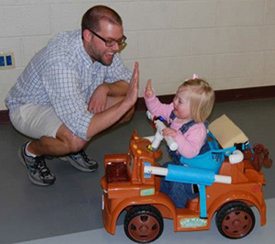
Cole Galloway PhD, PT & Sam Logan PhD, with Jim McGinty, Brian English & the Nottingham High School DECA Club.
High dose movement and mobility is a hallmark of life for typically developing children and their families. It is also the gold standard to judge the effectiveness of Movement-‐ and Mobility-‐ related Assistive technology (MMAT). Too often pediatric MMAT are smaller hand-‐me-‐down technology from adult rehabilitation. 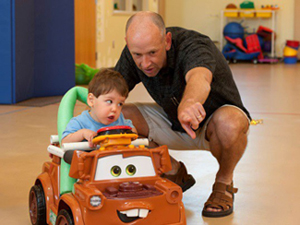 The workshop will introduce the rationale for and provide examples of a new generation of developmentally-‐inspired AT. It will focus on three categories of AT (power wheelchairs, exoskeletons/orthotics, and body weight support systems) to show how a paradigm shift is needed in the design, fabrication, funding and accessibility of MMAT. This shift can and should deeply involve clinicians, researchers and families in collaboration with industry. We will inspire participants to both advocate for a paradigm shift in AT and feel empowered to participate in the creation of the research and development of a new generation of Assistive Technology.
The workshop will introduce the rationale for and provide examples of a new generation of developmentally-‐inspired AT. It will focus on three categories of AT (power wheelchairs, exoskeletons/orthotics, and body weight support systems) to show how a paradigm shift is needed in the design, fabrication, funding and accessibility of MMAT. This shift can and should deeply involve clinicians, researchers and families in collaboration with industry. We will inspire participants to both advocate for a paradigm shift in AT and feel empowered to participate in the creation of the research and development of a new generation of Assistive Technology.
Demonstration of Power Soccer at the Institute for Human Performance
CNY United Power Soccer Team 2012 National Champions
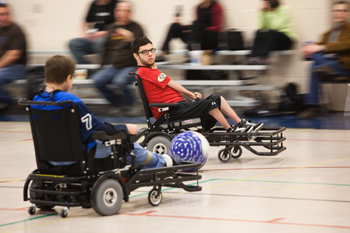
Power soccer is a sport played by athletes in power wheelchairs. Athletes use the agility of the chair and their driving prowess, along with teamwork to systematically move an oversized soccer ball down a gym court with skill and speed.
Jim Sefick of Baldwinsville, NY started the program in 2006 and they have played at a competitive level ever since. CNY United is part of the United States Power Soccer Association. In 2012 CNY United won the Champions Cup. CNY United Power Soccer offers both competitive and recreational opportunities to power chair users of all ages.
CNY United will be showing some basics of the game. Athletes will interact with onlookers and preform soccer moves such as the “spin kick.” Because power soccer is such a team sport, there will be cooperative drills to show how a typical game would flow.
How to Join: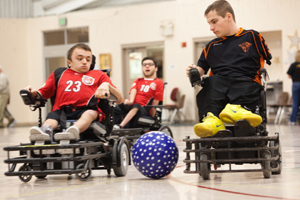
If you or someone you know is interested in power soccer feel free to contact the head coach, Jim Sefick at 315.345.1941 or by email at seffam@yahoo.com. You can also contact the team representative and captain Peyton Sefick at 315.546.3706 or by email at peytonsefick@gmail.com
Funding for this conference is gratefully acknowledged
Upstate Foundation/Golisano Children’s Hospital
SUNY Cortland Department of Physical Education
SUNY Upstate Medical University Department of Pediatrics
SUNY Upstate Medical University Department of Physical Medicine and Rehabilitation
SUNY Upstate College of Health Related Professions, Physical Therapy Program
Syracuse University School of Education
FACES of Nottingham High School, Syracuse City School District
